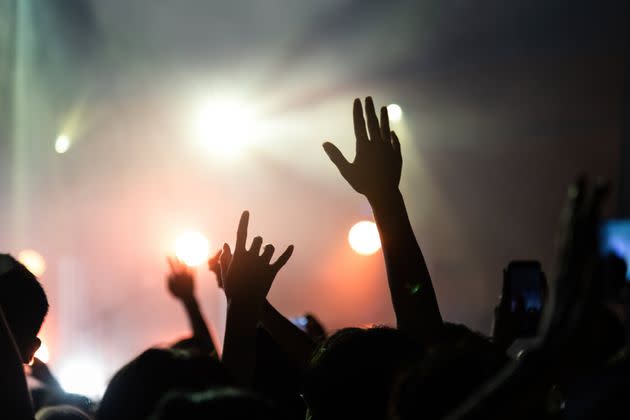10 Simple Steps You Can Take Today To Recover From A Festival

If you were at Glastonbury last week, I’m very happy for you and not one bit jealous. Nope. Not me.
Winding down from a festival is hard enough when you have to re-enter the real world that isn’t made up of spending every day with your mates, watching live music and partying with strangers until 4am. This year, however, festivalgoers are heading straight from the comfort of Glastonbury Festival to the uncertainty of a general election within days.
Terrible.
That’s why now, more than ever, you need to prioritise looking after yourself and getting back on track as gently as possible.
HuffPost UK spoke with Bethany Lawrence, Orthopaedic Expert at Panda London to learn exactly what we should be doing to feel better after a festival.
How to recover from a festival
Prioritise rest and elevation
Lawrence said: “After a festival, your body needs time to recuperate. Lie down and elevate your legs with pillows to reduce swelling and improve blood circulation.
“Elevation helps to decrease the pressure on your lower extremities and encourages fluid drainage.”
She explained that this simple technique can significantly alleviate discomfort, reduce fatigue and speed up recovery, allowing your muscles and joints to heal more efficiently after the physical exertion of the festival.”
Stay hydrated
We all know that we should be drinking much more water than we are – but proper hydration is essential for muscle recovery.
Lawrence advises: “Drink plenty of water throughout the day to rehydrate and flush out toxins from your system. Consider including electrolyte-replenishing drinks if you’ve been sweating excessively or consuming alcohol.
“Staying hydrated aids in maintaining muscle function, reducing cramps, and preventing dehydration, which can exacerbate fatigue and slow down the recovery process.”
Apply ice packs
Many of us aren’t quite as young as we feel when we’re at a festival, and the days after can be quite... humbling, especially when it comes to inflammation.
Lawrence said that one way to target inflammation and sore areas is using ice packs.
She advised: “Apply ice packs to your muscles and joints for 15 to 20 minutes at a time, several times a day. This helps to alleviate pain, reduce swelling and speed up the healing of any minor injuries sustained during the festival.
“Ice therapy is particularly useful for managing acute pain and preventing further inflammation in overworked muscles.”
Do some gentle stretches
You’ve likely been sleeping in a tent, sitting in unsupportive seats all weekend and walking far more than you usually would.
Treat yourself to some gentle stretching exercises to relieve muscle tightness and improve flexibility.
Lawrence said: “Focus on major muscle groups that have been overworked, such as the legs, back, and shoulders.
“Stretching helps to prevent stiffness, enhances blood flow to the muscles, and promotes quicker recovery. It also reduces the risk of injury by maintaining muscle elasticity and joint mobility.”
Biiiiig stretch.
Get your diet back on track with nutrient-rich foods
Festival food is often not quite as healthy as the meals you make yourself at home.
To get back on track, Lawrence advises consuming a diet rich in proteins, vitamins and minerals to support muscle repair and overall recovery.
This includes foods high in antioxidants, such as fruits and vegetables, to combat inflammation and promote healing. Protein is crucial for muscle repair, while carbohydrates replenish glycogen stores.
Lawrence added: “A nutritious diet provides the necessary fuel for your body to recover efficiently from the physical strain of the festival.”
Take some over the counter pain relief, if needed
Lawrence urged: “If you are experiencing significant pain, over-the-counter anti-inflammatory medications such as ibuprofen can provide relief. These medications help to reduce inflammation and alleviate pain, making you more comfortable as you recover.”
She added that it is important to use them as directed and avoid excessive reliance. Always follow the recommended dosage and consult with a healthcare professional if needed.
Wear some compression garments or socks
They’re not the sexiest things to wear, admittedl, but compression socks and garments can help to reduce swelling and improve blood circulation. They provide support to tired muscles and can be particularly beneficial if you have spent a lot of time standing or walking.
Lawrence said: “Compression aids in reducing muscle soreness, fatigue, and the risk of swelling by enhancing venous return and stabilising the muscles.”
Luxuriate in an Epsom salt bath
Listen, chances are, you need a bath anyway, so why not get one that can really help your muscles and joints?
Lawrence said: “Taking a warm bath with Epsom salts can soothe sore muscles and joints. The magnesium in the salts is absorbed through the skin, helping to reduce inflammation and relax the body.
“A 20-minute soak can alleviate muscle tension, improve circulation, and promote a sense of well-being, making it an excellent way to unwind and support recovery after a physically demanding festival.”
Get a massage, if you can
A massage is definitely not something everyone can afford, especially after the indulgences of a festival.
However, if you can, Lawrence strongly advises it.
Lawrence said: “Consider getting a massage to relieve muscle tension and promote relaxation. A professional massage can improve blood flow, reduce muscle stiffness, and speed up the recovery process.
“Massage therapy helps to release muscle knots, reduce stress, and enhance the body’s natural healing mechanisms, providing both physical and psychological benefits after the rigours of festival activities.”
Listen to your body
Lawrence said: “Most importantly, listen to your body and avoid pushing yourself too hard. If you feel overly fatigued or in significant pain, take it easy and allow more time for recovery.
“Adequate rest is crucial for your body to heal properly after extensive physical activity. Pay attention to your body’s signals and give yourself permission to rest and recover fully before resuming normal activities.”

